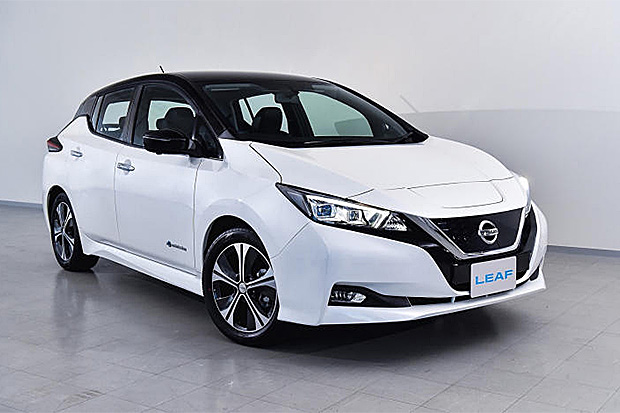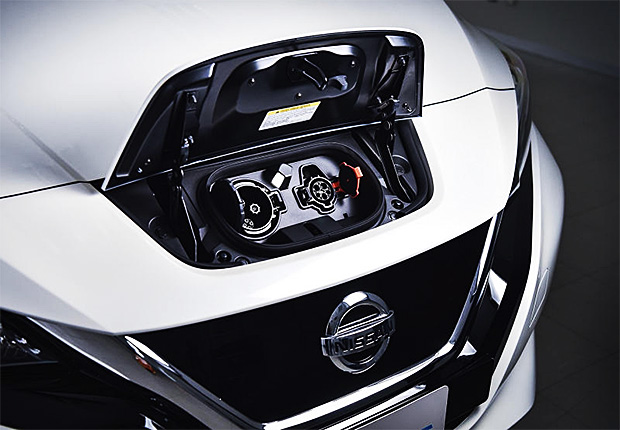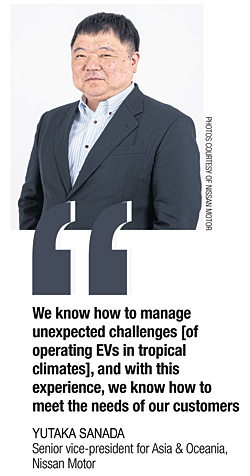Nissan Motor of Japan aims to maintain its top position in electric vehicle (EV) sales with the launch of the second-generation Leaf in key Asia Pacific markets and the all-new Leaf e+ in Japan this year.


The second-generation Nissan Leaf in Thailand sells for 1.99 million baht, more than twice what it costs in Japan.
"Nissan corporate has been, and wants to continue to be, the leader of electrification which started with the first generation of the Leaf in 2010 and the second generation that was launched in 2017," said Yutaka Sanada, the company's senior vice-president for Asia and Oceania.
"We have made enough preparation. We could, of course, just bring the car in [to Southeast Asia] but we have to make sure that our customers will be able to comfortably use and charge the car with the same quality they enjoy in Japan. Now we are confident enough to deliver the car to our customers here in Southeast Asia," he said.
The Leaf, the best-selling EV in the world, is now available in 49 markets. In Thailand it carries a price tag of 1.99 million baht (around US$62,550), compared with $29,990 in the US, where it is one of the least expensive all-electric models available.

Since the debut of the original Leaf in 2010, Nissan has sold 380,000 units globally, and Mr Sanada expects it will be available in more than 60 markets by the end of the current campaign.
Thailand, Malaysia, Singapore and Hong Kong became the company's newest markets in December. Mr Sanada expects the EV to be well received in Southeast Asia based on "very encouraging" in-house research results last year.
"Almost one-third of Nissan's customers in Southeast Asia are now ready to switch to an EV but some still have concerns over charging safety during a specific condition in the tropical climate," he said.
Hot weather can affect EV range as anything that puts stress on a battery can cause it to lose power. Heavy tropical rains also pose a potential threat to charging stations but Nissan is "confident" that this problem has been overcome, he said.
According to a Nissan-commissioned study by Frost & Sullivan, 37% of consumers in Singapore, Indonesia, Thailand, Malaysia, Vietnam and the Philippines have considered buying an EV for their next car. Cost is a big concern, but three in four respondents said they were ready to switch to EVs if taxes were waived.
According to Antoine Barthes, the president of Nissan Motor Thailand, the second-generation Leaf is subject to a 20% import duty, on top of which there is 8% excise tax, 10% interior tax and 7% value-added tax. Normally, all imported cars face an 80% import duty, but Nissan enjoys privileges for its batteries under the Japan-Thailand free trade agreement.
Even so, all those taxes mean the price of Leaf in Thailand is far higher than the Japanese price of ¥3.15 million (920,000 baht or $28,800). The Japanese government offers a subsidy of ¥400,000.
The Leaf model released in Thailand comes with a 147-horsepower electric motor powered by a 40 kilowatt-hour (kWh) battery that offers a range of 240km, or up to 311km as claimed by Nissan, when fully charged. This give the model around 40% more range than its predecessor.
A full charge using household electricity will take between 6 and 7.5 hours. A quick charge of one hour would allow a driving distance of around 35km. A quick-charging station can provide around 145km with a charge of 30-40 minutes. As of September last year, Thailand had 244 charging stations, 104 of them offering quick charging.
Mr Sanada said Nissan was working with the public and private sectors to expand charging stations, the number of which "will naturally expand step-by-step alongside the number of EVs on the roads". He hopes to see at least 500 stations in the country by the end of this year.
"Based on surveys with customers in Thailand, the average daily mileage per person is around 38-50km, which means we can cover almost one week of mileage with one charge, as the second-generation car's range is now 311km if fully charged."
Meanwhile, the all-new Leaf e+, boasting a 62kWh battery, is scheduled to make its debut in March or April in Japan, offering 364km per charge. Its new lithium-ion battery pack is about 50% larger than in the 2017 model.
The Leaf e+ will also be faster with a 217hp electric motor, but total driving range still trails the Chevrolet Bolt (383km), Kia Niro (385km), Hyundai Kona (415km) and Tesla Model-S (539km), which has a 100kWh battery pack. However, all four rivals cost more than the Japanese car.
Mr Sanada said that besides price, Nissan's comparative advantage was its longer experience in different climate conditions. "We know how to manage unexpected challenges and with this experience, we know how to meet the needs of our customers," he said.
Nissan also prides itself on innovation, specifically a new e-Power drive system that adds a small gasoline engine to charge the high-output battery when necessary, eliminating the need for an external charger.
In conventional hybrid systems, a low-output electric motor is mated to a gasoline engine to drive the wheels when the battery is low (or when travelling at high speeds). However, in the e-Power system, the gasoline engine is not connected to the wheels; it simply charges the battery.
Besides being as quiet as an EV, the e-Power system is more fuel-efficient because it relies on the engine much less frequently, according to Nissan. It says fuel efficiency is comparable to that of leading conventional hybrids, especially on around-town commutes.
The combination of EV drive with petrol convenience has proven popular in Japan -- the Nissan Note e-Power was the best-selling car there last year. Given the successes of both the Leaf and Note, Nissan now aims to sell one million EVs a year by 2022, Mr Sanada said.
"We are now planning to introduce this e-Power technology on top of the electric vehicles in Asia-Pacific as well," he said. "The Nissan Leaf is our icon … and the e-Power will also provide the EV driving experience but spec-wise it is different and I believe our customers can easily differentiate between the two."
The Note e-Power has 1.2-litre petrol engine used solely as a generator to provide a charge to the 1.5kWh lithium battery, which in turn powers the 40kW electric motor. It has a theoretical range of 1,300km between trips to a fuel station.
The Note e-Power Nismo starts at ¥1.79 million (around $16,350) in Japan where 136,324 units were sold last year.